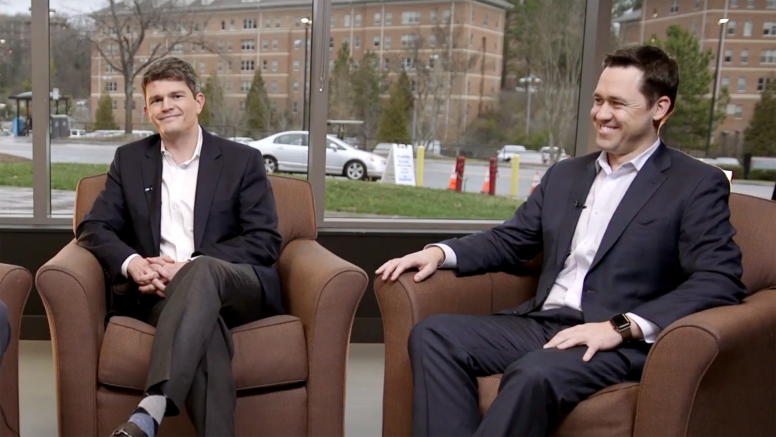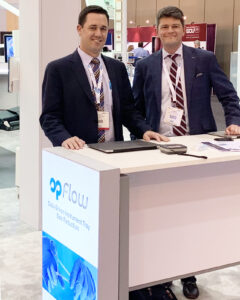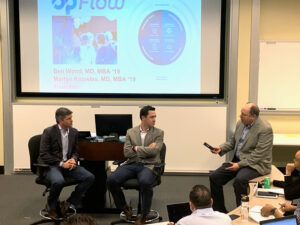News & Stories
Surgeons diagnose a problem and find a business solution

Surgeons Martyn Knowles and Ben Wood decided to earn their MBAs so they could turn their business idea into a reality.
Knowles and Wood (both MBA ’18) have been friends since they started medical school in 2003. They wanted to harness technology to solve a problem they encountered in operating rooms: unused surgical instruments and their hidden costs.
“We needed more than just two surgeons and an idea,” says Knowles. So he and Wood decided to enroll together in the Weekend Executive MBA Program to develop their business expertise and focus on the strategy and entrepreneurship track.
“The MBA program served as an incubator and accelerator for our product,” says Knowles. “We used our company as the basis for our class projects and received feedback from world-class faculty. Those relationships, cultivated by Ted Zoller and other faculty and the Business School’s entrepreneurship program, enabled us get to the point where we successfully launched our company even before the end of our MBA program.”
 They founded the healthcare technology company Operative Flow Technologies (OpFlow) in 2018. Wood serves as president and Knowles as chief medical officer.
They founded the healthcare technology company Operative Flow Technologies (OpFlow) in 2018. Wood serves as president and Knowles as chief medical officer.
“Alongside the technological expertise of our CEO David Rowe, the MBA program catalyzed the development of our idea to a commercially viable product, says Wood. One of the first markers of success was proving through the data what we thought would be true: that our solution would provide improved efficiency, cost savings and, ultimately, better patient outcomes.”
After a successful pilot project to provide proof of concept, they completed a 12-month project with UNC Rex Hospital to expand the use of the platform. “We received a great amount of excellent feedback from Rex Hospital and they were very excited about the data we provided,” says Knowles.
Then they expanded throughout the UNC Healthcare System and a total of 18 facilities in six large U.S. healthcare systems.
Diagnosing the problem
During a typical surgery, 70-80% of the instruments in an operating room aren’t used. Every re-usable instrument must be sterilized again, even if unused. The OpFlow platform is the first to collect data about instrument usage and build a hierarchy of procedures, instruments and facility types to drive an analytical, predictable process. They apply empiric, data-driven lean-management principles in the operating room, which provide significant cost savings for hospitals and healthcare systems by reducing waste, optimizing surgical instrument trays, and improving efficiency among the operating room team – without sacrificing patient safety or surgeon preferences.
Surgical procedures account for more than 60% of the operating costs of a hospital and about 15% of those costs – or roughly 9% of total hospital operating costs – are spent on surgical instruments. For a medium-sized hospital, that’s $4 million to $7 million per year in total surgical instrument spending. Across the 6,000-plus hospitals in the U.S., the costs soar into the billions.
To date, OpFlow’s optimization process has successfully resulted in almost two million fewer instruments taken into operating rooms annually. Those outcomes have produced multi-million dollar savings for hospitals and have reduced thousands of hours in hospital personnel labor for instrument sterile processing. Key to their success, trays optimized by OpFlow have been safely and effectively used over 100,000 times thus far.
OpFlow has filed U.S. and international patents and have clinically validated their process and solution with multiple peer-review publications and scientific meeting presentations across major surgical specialties. They partner with STERIS Instrument Processing Solutions and have additional partnerships pending with medical device vendors, allied health services and group-purchasing organizations. Up next: Exploring opportunities to integrate computer vision and AI into their workflow.
Continuing to collaborate with faculty
 A culminating event of the duo’s MBA career was winning the 2018 Launch Coaches’Choice Award. UNC Kenan-Flagler awards the recognition at the completion of Professor Ted Zoller’s Launch class and workshops, during which students develop knowledge, skills and connections needed to launch a business. Coaches in the areas of marketing, strategy, finance and law consult with founders of competing early-stage companies in preparation for a final venture pitch to a panel of judges.
A culminating event of the duo’s MBA career was winning the 2018 Launch Coaches’Choice Award. UNC Kenan-Flagler awards the recognition at the completion of Professor Ted Zoller’s Launch class and workshops, during which students develop knowledge, skills and connections needed to launch a business. Coaches in the areas of marketing, strategy, finance and law consult with founders of competing early-stage companies in preparation for a final venture pitch to a panel of judges.
“If you have an idea, the best possible way to determine its viability is to enroll in the UNC Kenan-Flagler Executive MBA Program and put your idea to work,” says Knowles. “Between the network, the classes, the professors and the content, you come out well-versed in how to make your company a success.
Knowles and Wood remain deeply engaged at UNC Kenan-Flagler. They worked with operations faculty to develop an algorithm that enables software to automate most of the complex task of reducing unnecessary instruments in operating rooms.
Collaborating with Vinayak Deshpande, Mann Family Distinguished Professor of Operations and Sandeep Rath, assistant professor of operations, and Nishanth Mundru, formerly of UNC Kenan-Flagler, they used OpFlow data to develop the algorithm. They detail their work in “Data-Driven Surgical Tray Optimization to Improve Operating Room Efficiency,” which was a finalist for the prestigious 2022 Innovative Applications in Analytics Award by the Institute for Operations Research and the Management Sciences (INFORMS).
The challenges are great and the future is exciting for OpFlow.
“With healthcare costs at an unsustainable level nationally, we as surgeons and healthcare providers have to look toward innovation for value creation,” says Wood.
“Healthcare is an inherently difficult place for entrepreneurs because lives are on the line,” Knowles says. “It takes a lot of trust for a hospital to look at a product.”
Read about the research by our OpFlow and UNC Kenan-Flagler here: Collaborating to cut hospital costs.